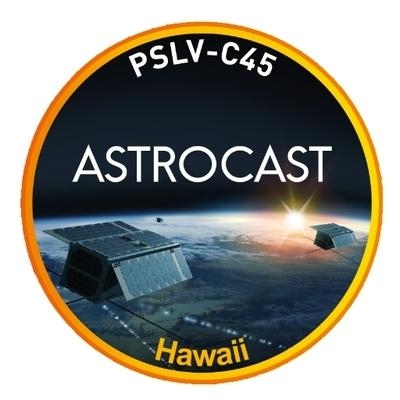Thu, Apr 04, 2019
Satellite Tests Clean Propulsion Technologies For Rapid Separation, Collision Avoidance, And De-Orbiting
Astrocast has successfully launched its second IoT Nanosatellite. The launch, piloted by Indian Space Research Organization (ISRO) on its Polar Satellite Launch Vehicle (PSLV), took place yesterday from the Satish Dhawan Space Center. This second mission will offer more opportunities to customers interested in testing the Astrocast IoT communication services. This mission will also focus on a set of propulsion technologies designed for separation, collision avoidance and de-orbiting.

“It is very important that companies think about the entire lifecycle of their nanosatellites. As a Swiss company, we will lead by example and do everything we can to keep space clean. Using a set of reliable and flight proven technologies, Astrocast is building the ability to control, maneuver and ultimately de-orbit its satellites,” said Fabien Jordan, CEO of Astrocast. “We can avoid collisions from other satellites, easily de-orbit and re-deploy satellites for technology upgrades, and reduce the amount of space debris left at the end of a satellite’s lifecycle. This nanosatellite represents the first of many technology advances we aim to develop toward the security and longevity of our network.”
The ability to control, reposition and de-orbit nanosatellites is key to lessening the amount of space debris that is currently plaguing low-earth orbit missions. Collision avoidance is an ongoing battle. Astrocast is the first to test a series of technologies that will allow them to have greater control and maneuverability of their network once it is launched. These technologies include:
- Gas propulsion
- Electric propulsion
- Automatic de-orbiting
- Backup communications
“It is important that companies begin to think long term about the nanosatellites they launch into orbit. Clean nanosatellite technology is possible, and we are taking some of the first steps toward this,” Jordan said.
This is the second test of the Astrocast IoT Nanosatellite network. The first test, launched in December, is fully stabilized with a working payload and is operating nominally. Astrocast is a nanosatellite network of 64 CubeSats specifically designed to transmit and receive low bandwidth data from IoT devices. Astrocast will be the first nanosatellite solution to deliver all of these features:
- 100% coverage of the globe including remote areas
- Lowest latency low earth orbit network
- Two-way communications
- L-Band and S-Band frequencies
- Communication module smaller than a credit card designed in partnership with Airbus
- 256 bit encryption with multi-level security
- Patented data protocol developed and optimized for satellite IoT
- Low-cost and ultra-low power chipset optimized for Astrocast
- Miniaturized antenna
- Low-cost data plans
- Web application for monitoring assets and subscription plan.
(Source: Astrocast news release)
More News
He Attempted To Restart The Engine Three Times. On The Third Restart Attempt, He Noticed That Flames Were Coming Out From The Right Wing Near The Fuel Cap Analysis: The pilot repor>[...]
Make Sure You NEVER Miss A New Story From Aero-News Network Do you ever feel like you never see posts from a certain person or page on Facebook or Instagram? Here’s how you c>[...]
From 2009 (YouTube Edition): Leading Air Show Performers Give Their Best Advice for Newcomers On December 6th through December 9th, the Paris Las Vegas Hotel hosted over 1,500 air >[...]
Aero Linx: NASA ASRS ASRS captures confidential reports, analyzes the resulting aviation safety data, and disseminates vital information to the aviation community. The ASRS is an i>[...]
“For our inaugural Pylon Racing Seminar in Roswell, we were thrilled to certify 60 pilots across our six closed-course pylon race classes. Not only did this year’s PRS >[...]
 NTSB Final Report: Rutan Long-EZ
NTSB Final Report: Rutan Long-EZ ANN FAQ: Turn On Post Notifications
ANN FAQ: Turn On Post Notifications Classic Aero-TV: ICAS Perspectives - Advice for New Air Show Performers
Classic Aero-TV: ICAS Perspectives - Advice for New Air Show Performers ANN's Daily Aero-Linx (06.28.25)
ANN's Daily Aero-Linx (06.28.25) Aero-News: Quote of the Day (06.28.25)
Aero-News: Quote of the Day (06.28.25)



